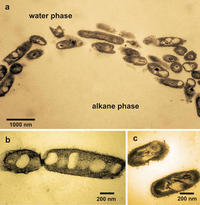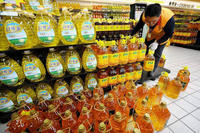-
Addresses trade-offs between food security, greenhouse gas emissions
Agriculture and land use change contributed about 1/3 of total human greenhouse gas emissions in the past decade, through crop cultivation, animal production, and deforestation. Improving agricultural productivity could help cut greenhouse gas emissions from agriculture, a new study shows, but sustainable farming methods are key.
-
-
Lawmakers uneasy about Smithfield’s acquisition by a Chinese food giant
Lawmakers last week questioned Smithfield Foods CEO Larry Pope about the proposed acquisition of the pork producer by China’s largest meat producer. Lawmakers are worried that the acquisition will negatively affect U.S food supply and agricultural producers.
-
-
Brazil’s problem: abundant grain, inadequate storage
Tropical climates that allow for year-round farming would seem to be a tremendous economic advantage, but for corn and soybean farmers in the Brazilian state of Mato Grosso it also poses a problem — an abundance of grain followed by about a 10 percent postharvest loss, partially due to a lack of storage.
-
-
Oil-devouring microbe communities a mile deep in the Gulf

The Deepwater Horizon explosion on 20 April 2010, caused the largest marine oil spill in history, with several million barrels of crude oil released into the Gulf of Mexico over the course of three months. Soon after the spill began, a massive oil slick was visible from orbiting satellites, yet once the underwater gusher was sealed, obvious traces of the crude oil disappeared much sooner than nearly all observers predicted. Some of the oil evaporated; some was skimmed off. Microbes “ate” much of the oil as well.
-
-
Treating oil spills with chemical dispersants may do more damage than good
Treating oil spills at sea with chemical dispersants is detrimental to European fisheries. Post-spill chemical dispersants may reduce problems for surface animals, but the increased contamination under the water reduces the ability for fish and other organisms to cope with subsequent environmental challenges.
-
-
Increasing food production from existing farmland
A policy known as sustainable intensification could help meet the challenges of increasing demands for food from a growing global population. The goal of sustainable intensification is to increase food production from existing farmland. Sustainable intensification would minimize the pressure on the environment in a world in which land, water, and energy are in short supply.
-
-
Improving crop resilience, yields in a world of extreme weather
Farmers in the United States witnessed record-breaking extremes in temperature and drought during the last two summers, causing worldwide increases in the costs of food, feed and fiber. Indeed, many climate scientists caution that extreme weather events resulting from climate change is the new normal for farmers in North America and elsewhere, requiring novel agricultural strategies to prevent crop losses. UC Riverside-led research team develops new chemical for improving crop drought tolerance.
-
-
Rapid, on-site detection of illegal cooking oils

In recent years, illegal cooking oil incident in China caused serious food safety risks. Researchers have developed two rapid and convenient colorimetric detection methods of illegal cooking oils based on phase transfer technology.
-
-
The future of Colorado River flows
The Colorado River provides water for more than thirty million people, including those in the fast-growing cities of Las Vegas, Phoenix, and Los Angeles. Increasing demand for that water combined with reduced flow and the looming threat of climate change have prompted concern about how to manage the basin’s water in coming decades.
-
-
Smart technologies tackle global food shortage
From monitoring soil moisture to measuring oyster heartbeats, Aussie farmers can help to tackle the global food shortage and significantly increase their productivity by taking advantage of new smart farming technologies enabled by next generation broadband networks.
-
-
Factors influencing spinach E. coli contamination before harvest
Researchers have identified a variety of factors that influence the likelihood of E. coli contamination of spinach on farms prior to harvest. They found that E. coli contamination of spinach on farms in Colorado and Texas was 172 times more likely if the produce field was within ten miles of a poultry farm, and sixty-four times more likely if irrigated by pond water.
-
-
Weather reports aid life-or-death decisions in Africa
The people living in sub-Saharan Africa have a life-or-death dependency on information about the weather. Knowing when, where, and what to grow or graze animals can be the difference between a bumper harvest and facing starvation. Although sub-Saharan Africa depends more directly on rainfall than any other region on Earth, the region has the fewest number of rain monitoring stations. There are also significant delays in the time between measurements being made and the resulting data being made available.
-
-
Fukushima-derived radioactivity in seafood poses minimal health risks
Researchers find that the likely doses of radioactivity ingested by humans consuming fish contaminated by radioactive radiation escaping from the debilitated Fukushima reactors fish, are comparable to, or less than, the radiological dosages associated with other commonly consumed foods, many medical treatments, air travel, and other background sources.
-
-
U.S. unlikely to meet its biofuel goals

The Energy Independence and Security Act of 2007 (EISA) mandates that by 2022 the United States derive fifteen billion gallons per year of ethanol from corn to blend with conventional motor fuels. A new study says that if the climate continues to evolve as predicted by the Intergovernmental Panel on Climate Change, the United States stands little to no chance of satisfying its biofuel goals.
-
-
Improving “crop per drop” boosts global food security, water sustainability
New study shows increasing crop water productivity could feed an additional 110 million people while meeting the domestic water demands of nearly 1.4 billion.
-
- All
- Regional
- Water
- Biometrics
- Borders/Immig
- Business
- Cybersecurity
- Detection
- Disasters
- Government
- Infrastructure
- International
- Public health
- Public Safety
- Communication interoperabillity
- Emergency services
- Emergency medical services
- Fire
- First response
- IEDs
- Law Enforcement
- Law Enforcement Technology
- Military technology
- Nonlethal weapons
- Nuclear weapons
- Personal protection equipment
- Police
- Notification /alert systems
- Situational awareness
- Weapons systems
- Sci-Tech
- Sector Reports
- Surveillance
- Transportation
Advertising & Marketing: advertise@newswirepubs.com
Editorial: editor@newswirepubs.com
General: info@newswirepubs.com
2010-2011 © News Wire Publications, LLC News Wire Publications, LLC
220 Old Country Road | Suite 200 | Mineola | New York | 11501
Permissions and Policies
Editorial: editor@newswirepubs.com
General: info@newswirepubs.com
2010-2011 © News Wire Publications, LLC News Wire Publications, LLC
220 Old Country Road | Suite 200 | Mineola | New York | 11501
Permissions and Policies
